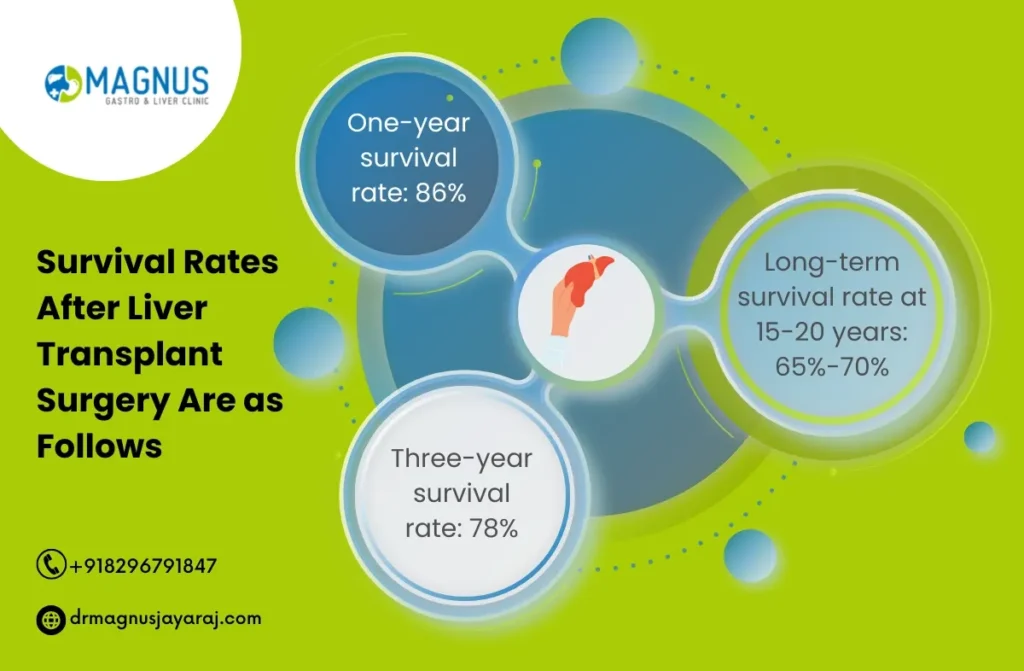Liver transplantation is a life-saving procedure for individuals experiencing liver failure. In India, the success rate of liver transplants is commendable, with nearly 95% of patients recovering successfully and leading healthy lives. This blog aims to provide an in-depth understanding of liver transplant success rate in India, including short-term and long-term survival rates, factors influencing success rates, and the risk of rejection.
What is Liver Transplant Surgery?
Liver transplant surgery is a medical procedure used to treat patients with irreversible liver damage due to diseases like liver cirrhosis, liver cancer, and acute liver failure. This life-saving surgery replaces the diseased liver with a healthy liver from a living or deceased donor. In some cases, a partial liver can be transplanted from a living donor.
The liver performs several vital functions, such as detoxifying harmful substances, aiding digestion, producing proteins essential for blood clotting, and storing energy in the form of glycogen. When the liver fails, these functions are impaired, leading to severe health complications. A liver transplant becomes the only solution for those suffering from end-stage liver disease.
Significance of Success Rates
- The success rate of liver transplant in India reflects advanced surgical skills, top facilities, and improved patient care.
- A high liver transplant survival rate in India helps patients make confident, informed treatment decisions.
- These rates set benchmarks for hospitals, highlighting clinical excellence and safety standards.
- India’s strong success rates attract global patients seeking quality and affordability.
- Better survival rates indicate improved post-transplant recovery and long-term health.
- Positive outcomes encourage organ donation and build public trust in the system.

Why Choose Magnus to Get the Liver Transplant Success Rate in India?
Liver transplantation requires expert surgical skill, high-end technology, and multidisciplinary care. Dr. Magnus Jayaraj Mansard, one of India’s foremost experts in liver transplantation, leads the liver transplant program at Magnus Gastro and Liver Clinic with unmatched precision and clinical expertise. Under his guidance, the clinic has achieved consistently outstanding outcomes, strengthening its reputation for delivering one of the highest liver transplant success rates in India.
- Expertise of Dr. Magnus Jayaraj Mansard: Dr. Magnus Jayaraj Mansard is a renowned gastrointestinal and liver transplant surgeon with extensive experience in managing complex liver disorders. His precision and commitment to innovation make him a trusted name in the field of hepatobiliary surgery.
- High Liver Transplant Success Rates: Magnus Gastro and Liver Clinic consistently reports liver transplant survival rates exceeding 90%, matching international healthcare standards.
- Advanced Surgical Facilities and ICU Support: Equipped with robotic-assisted systems, precision imaging, and state-of-the-art operating rooms, Magnus ensures safe and efficient transplant procedures.
- Personalized Multidisciplinary Treatment Approach: Dr. Magnus Jayaraj Mansard works alongside hepatologists, anesthesiologists, transplant coordinators, and dietitians to offer tailored care before, during, and after surgery.
- Ethical Practice and Transparent Communication: Magnus upholds high ethical standards in organ allocation, informed consent, and post-operative education, ensuring every patient is well-informed.
- Preferred by International Patients: Magnus combines cost-effective treatment, exceptional medical care, and the skilled leadership of Dr. Magnus Jayaraj Mansard to deliver outstanding liver transplant outcomes.
Success Rates by Age
The success of liver transplant surgery in India is influenced by various factors, with age being one of the most significant. Studies have shown that younger patients generally have higher success rates. The liver transplant survival rate in India is typically higher for patients under 50 years old, as they tend to have fewer comorbid conditions and better overall health.
However, older adults, particularly those over 60, can still benefit from liver transplantation, but their success rates may be slightly lower. This is due to the increased likelihood of underlying health conditions such as heart disease, diabetes, or hypertension, which can complicate the surgery and recovery process.
Age-based Survival Rate:
- Under 50 years: 80-90% survival rate at 1 year.
- 50-60 years: 75-80% survival rate at 1 year.
- Above 60 years: 60-70% survival rate at 1 year.
While the liver transplant survival rate in India is impressive, it is essential to consider age as a determining factor when evaluating the chances of success.
Factors Affecting Liver Transplant Success Rates
The success rate of liver transplants in India can be influenced by various factors, some of which can be modified while others cannot.
Modifiable Factors
Modifiable factors affecting the liver transplant success rate in India include:
- Patient Selection: The overall health and suitability of the patient for the procedure play a crucial role in the success of liver transplantation. Individuals with severe medical conditions or complications may not be suitable candidates for the surgery.
- Post-Transplant Care: The quality of post-transplant care, including medications and monitoring to prevent rejection and infection, significantly influences the success rate of liver transplant in India. Adhering to the prescribed treatment plan and attending follow-up appointments are vital for optimal outcomes.
- Lifestyle Modifications: Making positive lifestyle changes, such as abstaining from alcohol and maintaining good hygiene practices, can contribute to a higher success rate.
Non-Modifiable Factors
Non- modifiable factors that can affect the liver transplant success rate in India include:
- Donor Availability: The availability of a suitable donor liver affects the success rates of transplantation. Longer waiting times for liver transplantation due to a shortage of donors may reduce the chances of a successful transplant. In living donor transplants, compatibility in terms of blood group, HLA, and DNA match is crucial.
- Age: Advanced age can impact the success rate of liver transplant in India, as older patients may be more susceptible to complications and have a lower success rate compared to younger patients.
- Underlying Medical Conditions: The presence of pre-existing medical conditions, such as diabetes or cardiovascular disease, can increase the risk of complications and impact the success rate of liver transplants in Chennai.
- Cause of Liver Failure: The underlying cause of liver failure can also affect the success rates. For example, individuals with liver failure caused by viral hepatitis may have a higher success rate compared to those with liver failure caused by other conditions.
Factors Influencing Liver Transplant Success
- Medical Expertise and Facilities: The survival rate after liver transplant in India is higher in centers with skilled surgeons, advanced ICU care, and robust infection control protocols.
- Patient-Related Factors: The success of liver transplant surgery in India depends on the stage of liver disease, overall health, and adherence to post-transplant care.
- Donor-Related Factors: Compatibility in blood type, organ size, and timely organ retrieval are crucial for better graft acceptance and reduced complications.
Risk of Delayed Liver Transplant
Delayed liver transplants pose significant risks to patients and can reduce the chances of a successful outcome. If a survival rate after liver transplant in india is not performed promptly, liver disease may worsen, making the procedure more complicated. In such cases, the liver may be more difficult to transplant, and the chances of infection or organ rejection increase.
Potential Risks of Delayed Liver Transplant:
- Progressive Liver Damage: Delay in transplant surgery can lead to irreversible liver damage, making the procedure less effective.
- Increased Risk of Infection: Patients waiting too long for a transplant are at a higher risk of developing infections that can complicate the surgery and recovery.
- Higher Mortality Risk: Delayed transplantation increases the likelihood of complications, which can decrease the survival rate after liver transplant in India.
Timely intervention is key to achieving the best liver transplant success rate in India. Early detection and prompt action are crucial in ensuring that the transplant is performed at the most optimal stage of liver disease.
The Recovery Process After a Liver Transplant
After undergoing a liver transplant, a structured recovery plan in India ensures long-term health and a high liver transplant survival rate in India. Key aspects include:
- Hospital Stay – Patients typically stay for 2–3 weeks post-surgery.
- Medication Management – Anti-rejection drugs are essential for maintaining the success of liver transplant surgery in India.
- Lifestyle Changes – A healthy diet and regular check-ups improve the survival rate after liver transplant in India.
- Infection Prevention – Strong immunity plays a key role in the liver transplant success rate in India.
Can You Live a Normal Life After a Liver Transplant?
Yes, most patients can live a normal and fulfilling life after a liver transplant. A successful liver transplant not only restores liver function but also improves overall quality of life. Here’s what to expect after the surgery:
- Improved Energy Levels: Fatigue and weakness caused by liver failure are alleviated.
- Dietary Freedom: Patients can enjoy a balanced diet, though alcohol is strictly prohibited.
- Long-Term Survival: With proper care, the survival rate after liver transplant in India is impressive.
Tips for Maintaining a Healthy Life Post-Transplant:
- Take prescribed medications to prevent organ rejection.
- Follow a healthy diet plan recommended by your doctor.
- Avoid alcohol and tobacco completely.
- Regularly attend follow-up appointments.
- Engage in moderate physical activity once approved by your doctor.
Is Liver Transplant Successful in India?
India boasts some of the highest success rates for liver transplant surgeries globally. The success of liver transplant surgery in India is attributed to:
- Experienced Surgeons: Surgeons in India have vast expertise in performing complex liver transplants.
- State-of-the-Art Facilities: Hospitals in Chennai and other major cities are equipped with advanced technologies.
- Affordable Costs: Despite high success rates, liver transplant surgeries in India are more cost-effective than in many Western countries.
Conclusion
Liver transplantation in India boasts an impressive success rate, providing hope and extended years of life to patients with liver failure. While the risk of rejection remains, advancements in medical practices and close monitoring contribute to minimizing complications, increasing the chance of liver transplant success rate in India to offer a ray of hope for patients in need of this life-saving procedure.




